Welcome to the week.
Here are the most notable stories and other items our community flagged from the past seven days.
This week’s sponsor is Vvolt Electric Mobility, a Portland-based company that is rethinking personal transportation.
Hit by a nice driver: A Portlander was hit by a driver while walking on NE Broadway and it turned into an interesting relationship that included free weed and a hug. ((In)Action Substack)
Disrupting driving: Turns out getting people to switch from driving to other modes is really hard because of how our brains are wired, but science has answers about what can help flip the switch. (Slate)
E-bike rebates: California is about to turn on their long-awaiting e-bike rebate program. The good news is folks can receive up to $2,000 to buy a bike. The bad news is there are only 1,500 vouchers to go around. (Electrek)
Federal immunity in Salem: A DEA agent actively working a case was given immunity by an Oregon judge for his role in killing a bicycle rider with his car. (The Oregonian)
How Philadelphia protects cyclists: Always interesting to see what other cities are doing to protect bicycle riders. Of particular note is a bill passed by Philly City Council that increases fines for drivers who park in bike lanes. (The Conversation)
Black cycling revolution: It took too long, but due to a critical mass of riding clubs and community organizers, there’s finally a foundation of cycling culture for Black people across the globe to identify with and plug into. (The Guardian)
Get on the “cycle train”: Love this forgotten history of an event organized by bike shops in the 1940s that carted cyclists from L.A. to San Diego on a train just so folks could enjoy a bike ride in a new city for the day. (Forgottenmadness_la on IG)
Unenforcement: A report found that police officers in New Jersey nearly stopped writing traffic tickets after leadership planned to scrutinize them for racial injustice. (NY Times)
Loser Lane: A brilliant activist created an arcade-style game to make a point about the terrible policies of Toronto’s Doug Ford. (Momentum)
Suburban splendor: There are systemic (and unsurprisingly very partisan) reasons why most Americans say they would prefer to live in sprawled-out suburbs rather than a walkable city. (The Washington Post)
Thanks to everyone who sent in links this week. The Monday Roundup is a community effort, so please feel free to send us any great stories you come across.



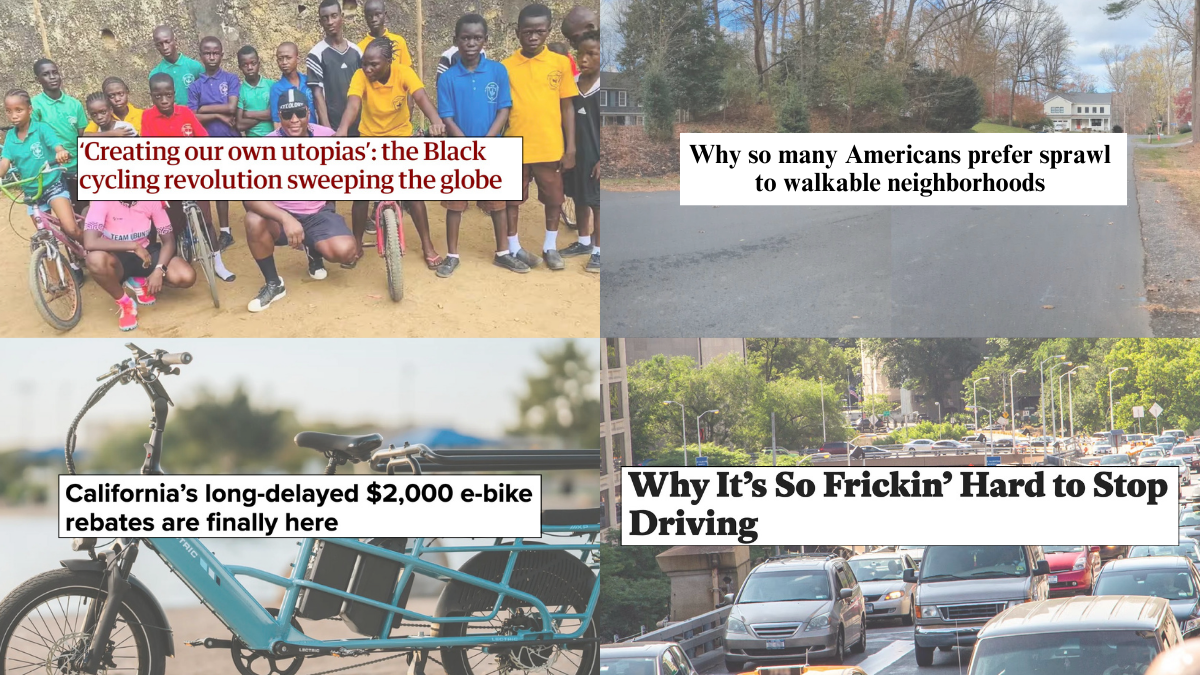

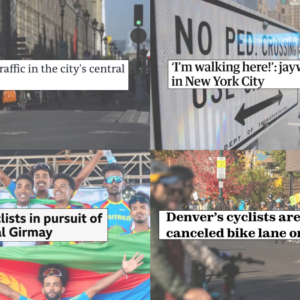
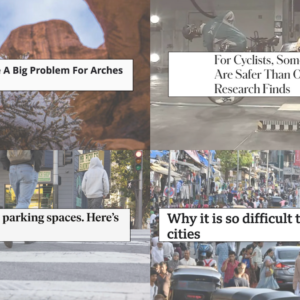
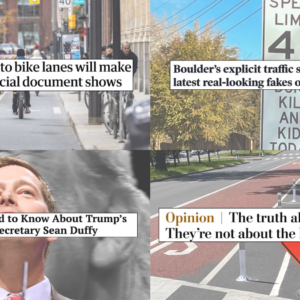
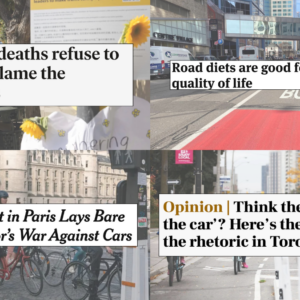
Thanks for reading.
BikePortland has served this community with independent community journalism since 2005. We rely on subscriptions from readers like you to survive. Your financial support is vital in keeping this valuable resource alive and well.
Please subscribe today to strengthen and expand our work.
From the Post article:
This is one of the realities we have to contend with if we want society to move towards transit as a primary mode of transportation. Transit can work well connecting 15-minute neighborhoods (or it can fail, as it does in many cases in Portland), but it is very hard to make it work for the sorts of large, dispersed settlement many told Pew they prefer.
Even if we house more people in the inner city, people aren’t going to abandon outlying areas, and people living there will still need to get around.
Just ever more heaps and heaps of status quo bias.
I don’t care what people say on a survey they prefer (well, I do in that it is one point). As mentioned in another article, people prefer whatever they’re habituated with. People prefer smoking if you’re in the 1960s. People say they prefer to drive having never experienced functional transit.
What they like about their suburban sprawl is that they have more living space for less money. That’s not a fact that’s built in to suburban living. That’s a policy choice. Give people actual family homes in dense urban areas with a better back yard (i.e. a park) they don’t have to maintain at a similar price, people will want it. Hell, for that matter I think the article gets the causality in the pricing wrong. They suggest people want to live in the suburbs but that doesn’t account for the high price for small homes in cities! People are paying that high price. It’s just that many people want a bit more space to put their tricycle and don’t want to pay CEO prices for it. We should be building more actual family apartments and condos, not catering to the proclaimed wishes of people who don’t know any different.
Are you suggesting that if we just built more apartments close-in so those “don’t know any better” people could just move to the central city, folks would abandon their suburban housing? If not, my point about the challenges of moving to a transit-dominated world still stands.
As long as local, state, and federal governments signal they will forever expand road networks and keep fuel prices low, and use tax policy to incentivize large homes, people will prefer the lifestyle that is facilitated and promoted by those government actions. But if government incentives weren’t directed to these areas, people likely would prefer a different lifestyle.
Even it that’s true (which it probably isn’t), it still leaves the problem that governments are brutally punished by voters when gas prices rise, so they’re going to work hard to keep them low until voters signal they would support higher gas prices and reduced support for suburban areas. And anyway, gas prices will become less relevant as we continue to electrify, so that lever is steadily eroding.
Even if everything you say is true, people still aren’t going to just abandon the built suburbs… we will continue to live there and will pose the same transportation dilemma we face now.
Hard to imagine a world in which people(particularly Americans) abandon the suburbs. But not at all difficult to imagine a world in which people desire to move back to cities in greater and greater numbers if driving SOVs becomes significantly more expensive and difficult. Can also imagine a push to densify and urbanize existing suburbs in such a scenario.
Do you think this is going to happen anytime soon?
Not likely. As you note, voters will likely rebel if politicians promote significantly different policies. But I think it’s important to understand that the reason that people express the preferences that were noted in the survey is not something intrinsic to the human condition or even American culture, but rather it’s rational responses to market forces that are manufactured by government policy. It’s not that people prefer to live in the suburbs. They just prefer to maximize utility.
I’m suggesting we should be building more *family* apartments, as what seems to be built now (if anything) clearly doesn’t meet that definition. I can say as a person with family and a house, the reason I have a house isn’t because I want to waste my time taking care of a yard and doing my own maintenance. It’s because something of anywhere near comparable size either doesn’t exist or costs twice as much as my already incredibly overpriced house. It doesn’t really have to be that way though.
And the point isn’t to move people out of the suburbs, it’s to make it so new residents choose the city instead of adding to the sprawl of suburbia. Over time that results in a denser city, better services, and shrinking suburbs (or densifying suburbs to the point of being urbs).
Family units are less profitable, so they don’t get built. City planners and neighborhood leaders in SE have been trying to change that for, literally, decades, and we haven’t figured it out yet (I think the code briefly required it, but the provision went the way of the bike room requirement). If you know the answer, please tell someone — I want to see more family units in my neighborhood in part because schools here, like everywhere in Portland, are about to fall off a demographic cliff.
If we did build more family units, you’d still need to find people who wanted to raise kids in an apartment (nothing inherently bad about that, but it’s not what most of us dream of, especially if you want your kids to learn about gardening, tools, and other life enrichments, have an office or a place for your family bicycles that’s not your living room, host guests, or have any hobbies that involve noise or space). You’ll also need a critical mass of folks who would want to live below or share a wall with a family with kids (builders still haven’t embraced soundproofing, apparently).
I’m not saying demand for more family units doesn’t exists, but that it’s a minority who wants it, and they are, as the survey reported, mostly people who, like you, fit into a fairly narrow demographic slice. That may lead you to think there’s more demand for apartment living than there really is.
Regardless, merely making the problem of the suburbs not get worse does not address the underlying problem with serving these large areas with transit. Meanwhile, our dear governor, who I’m sure you voted for and will vote for again, is “showing leadership” by helping weaken our long-cherished land use laws to allow people to build housing on more of our farmland.
Capitalism for the win again, I guess.
Yeah, yet again, a tautology. Our government lacked the courage to implement its own policies, so the thing it was meant to address didn’t get addressed!
This is what I mean when I say we don’t build family apartments (or condos, those should be included). These are all things you can do in a condo/apartment. An office is just another bedroom, guests is just a slightly larger dining room (and extra bedroom). A bicycle room is just… yeah, another room. A garden is an outdoor planting bed or community garden / courtyard, etc (or this is what school is for). This is what is meant by “we don’t build apartments for families.”
Unless your main hobby is being like, a car mechanic, there is no particular advantage to suburban sprawl vs. a multi-unit building like an apartment or condo.
No, not really. The survey showed it’s a minority who wants the tiny existing not really family oriented apartment options on offer now.
Yes it does, because if we stop the sprawl, these large areas of low density housing will become areas of high density housing. And people in the suburbs have kids, and those kids grow up and want to live somewhere, and if they have options that don’t suck to live in and raise a family in the city, they will move.
Our governor should be impeached for what she’s doing to our land use laws.
It’s also why those condos you say you like are so expensive.
Sure.
Will you vote for her if she runs again? Heck, it doesn’t matter… it’s Oregon, so she’d win.
Those condos are so expensive because of various reasons, largely housing speculation. The invisible hand of the market. There is nothing that says they have to be that expensive except we live in a place where we incentivize greed instead of providing for people
No I obviously won’t vote for someone I think should be impeached. But in Oregon, since we don’t have state wide ranked choice voting that is so maligned on this forum, we will rarely if ever get anything other than a Republican or a Democrat, and a Republican will be decidedly worse (and have no chance). Maybe in the long run, making Democrats lose could help them get their act together and suck less. But hey, it hasn’t worked for Republicans in this state so I don’t see it working on Democrats. Republicans are also free to not be garbage if they wanted to try their hands at winning here, and they don’t.
For all the complaining I’ve seen you do about our more democratic voting system in Portland, you sure do rail about how people vote for the same Democrats every time. Yeah, no kidding, that’s why we need ranked choice.
If you want all the space and amenities you stated, it is going to be expensive. I don’t know if it’s because of “speculators” or just because building big units in big buildings is almost as expensive as building two or three smaller units, and why would a builder do that if they couldn’t collect two or three times as much rent?
I have indeed been very critical about many aspects of our charter reform (especially the parts that reduce public influence over bureaus), but not ranked choice voting (I’ve said many times it would be fine if we had away to narrow the candidate field to, say, 6 before the general election).
Unfortunately, M117 failed quite resoundingly, so it will be a while before we know whether statewide ranked choice would attract better candidates (though from your perspective, probably not because the biggest unfilled niche is a more conservative Democrat, the lane Betsy Johnson tried to take, and I’m quite sure you choose Kotek over her).
At least you and I do agree that weakening our land use laws is terrible.
I believe that’s true in regard to City planners, but frustratingly the City (planners and others) often does things that interfere with achieving that, such as creating poorly-considered zoning regulations, and focusing on density of units over density of people.
The shortage of family units is not a question of zoning, it’s a question of economics. I suppose zoning could require family units, but you are probably aware how well the zoning requirement for affordable units is working.
Economics may be the driving impediment, but that doesn’t excuse regulations that get in the way of building family units. And regulations (zoning and other) do get in the way.
The idea of zoning requiring family units doesn’t sound great to me, either.
What are some examples of regulations that make it difficult to build family units?
And Portland seems to be changing into much LESS of a 15 minute city with the loss of large retailers (REI, WALMART, some Targets), implosion of Lloyd Center mall and loss of many small retailers. My family now drives TO the suburbs for shopping.
I appreciate the links to various stories, but please advise your readers in advance if they will encounter a paywall before they can read the article mentioned. Thanks.
Hi Beth. I hear you. I will consider doing that.
archive.is
Big props to Jonathan for actually having the guts to bring up the positives of police traffic enforcement on Bike Portland. You don’t usually see that kind of talk here, but it’s honestly refreshing. We can’t keep pretending like we’re gonna magically solve Portland’s traffic violence problem just by putting in bike lanes, better infrastructure and hoping for the best. Sometimes, a little bit of enforcement goes a long way.
Let’s face it—people are driving like maniacs, and if we don’t get serious about slowing that down, we’re not going to see real change. This isn’t just about cyclists or pedestrians; it’s about saving lives, period. So, thanks for having the courage to throw that out there, Jonathan. It’s a tough conversation, but it’s one we have to be having if we want to make Portland safer for everyone.
This article described cops quitting one of the things they’re good for because they were threatened with a modicum of accountability, and you wonder why people are skeptical of cops?
John V, it’s possible to be skeptical of police accountability and acknowledge that traffic enforcement saves lives. The two aren’t mutually exclusive. The point isn’t about giving cops a free pass—it’s about recognizing that unchecked reckless driving has real consequences for everyone.. We can demand reforms and still understand that enforcement is a critical tool in addressing traffic violence. Let’s not let perfect be the enemy of good here.
“In July 2023, New Jersey state troopers who patrol the state’s busiest highways and remote rural roads suddenly began writing far fewer traffic enforcement tickets. The next month, citations for speeding, drunken driving, cellphone use and other violations plummeted by 81 percent across the state compared with the year before.
The sweeping slowdown in enforcement continued for more than eight months and coincided with an almost immediate uptick in motor vehicle crashes, records obtained by The New York Times show.“
Stop trying to change the subject.
What are you talking about? Did you even read the comment you replied to? It was exactly the subject, it couldn’t be any more on the same subject. What you quote is a line saying exactly what I did, that the cops went on strike (stopped doing the job they are expected to do) in protest of the suggestion of maybe sort of accountability. Not accountability for doing their job, only the hint of accountability when they abuse their power. And they stopped doing their job.
That’s what they do. When there is any threat that they might face consequences for doing what we don’t want them to do, they protest by stopping doing the things that people do want them to do.
This couldn’t be more on topic.
The sweeping slowdown in enforcement continued for more than eight months and coincided with an almost immediate uptick in motor vehicle crashes, records obtained by The New York Times show.“
So you’re okay with this? The lesser of two evils?
You’re off in the weeds making stuff up about me that have nothing to do with what I said. I described a fact. The cops quit doing something that people like because they were faced with the possibility of accountability. This is why people are skeptical of cops.
Skepticism is a healthy trait; judgementalism based on stereotype is not.
What are you on about? There is no stereotype here, don’t try to make cops into a discriminated racial category or something. They use what amounts to blackmail, using their unrivaled monopoly on force and law enforcement to avoid the kind of oversight we would expect out of any other institution. This is why people have skepticism. They’re not being treated unfairly or stereotyped.
Oxford (according to Google) defines bigotry as “prejudice against a person or people on the basis of their membership of a particular group.” How is that not exactly what you are doing?
“That’s what they do” — no, that’s what some of them did. We’ve heard that song before.
Skepticism and oversight are good and necessary, especially in jobs that give people power over others. If you left it at that, we’d agree.
So what, we should leave out the actual reason for the need of oversight? The examples of things that have actually happened to lead us to think hey, this unaccountable gang needs to be brought under control.
Don’t bring out Oxford dictionary definitions like you’re a fifth grader doing a book report. Comparing complaints about the institution of policing to bigotry does so much injustice to the word it is an utter joke. You should be embarrassed for even writing that.
No, it is what the organization as a whole did. This is a fact and you can’t dispute it with any facts, just appeal to google oxford dictionary.
Ah, I didn’t realize from what you wrote that you were simply pointing out the potential for abuse (realized, sadly, in some cases) that comes with giving a group of people the ability to use force against others, and that one important tool for reducing that potential for abuse (and addressing it when it occurs) is oversight and monitoring by other parties, like elected officials, the courts, oversight boards, etc.
I thought you were castigating an entire profession based on the actions of some individuals.
My mistake.
I get where you’re coming from, mate—accountability in law enforcement is bloody important, no doubt about it. But I reckon it might help to take a step back and have a proper look at the bigger picture here.
Yeah, cops hold a unique position in society, and sure, they’ve got a monopoly on force—that’s part of the job. But saying they universally resist accountability and chuck a tantrum every time they’re asked to answer for their actions might be oversimplifying things. The reality is, when new oversight measures come in, some officers can feel like they’re being thrown under the bus for the actions of a few bad eggs. It’s not always black and white.
Now, does that excuse certain behaviour, like downing tools when they don’t get their way? Absolutely not. But it does highlight a bigger issue: a lack of trust and communication on both sides. Accountability’s got to be about building trust, not tearing it down—it should feel fair, not like a punishment.
Instead of focusing solely on what “the cops” are stuffing up, maybe the better question is: how do we strike a balance? How do we weed out the bad ones while supporting the good ones to do their job properly? Because at the end of the day, we all want the same thing—safe, fair, and effective policing.
What do you reckon, Can we steer this yarn towards real solutions instead of just butting heads?
I don’t know. Because we’re commenting on a story where accountability didn’t even happen, it was just proposed, and the response was a tantrum. Nobody is making up a caricature here, cops resist any accountability and I don’t think we should compromise on that. What we need is strong leaders willing to actually clean up corrupt police departments who do stuff like this. This isn’t a situation where “training” helps, they know what to do, they just don’t want to.
Huh?
This is a prime example of why you are incredibly frustrating to read and have discussions with on this site. I’m only pointing out in case you don’t realize this, but you have a very clear M.O. of being the “rational middle-ground -just-asking-questions” opinion while waving away information that doesn’t exactly match your contrarianism. and when people point that out you either completely misinterpret and misstate what they said or pick one sentence out of it that you don’t understand to post this type of comment. Perhaps you aren’t American because how else would you not know that cops resist any accountability? We could trot out an entire powerpoint of thousands of very recent instances, law suits, news reports etc of cops being absolutely bananas, selling drugs themselves so they can then arrest people, planting drugs, straight up murdering people over evading a subway fare, and you’d just chime in with like, “you misspelled that word” or “those are just individuals…bad apples etc.” and act like you had the upperhand. It is so frustrating Watts. Perhaps this is what you’re goal is and in that case, joke’s on me.
I will second what YrSocialistFrend is saying here. I too find your comments incredibly frustrating Watts, and not always in a good way, for similar reasons. In my case, as I expressed to you many times, I feel like you are willfully misunderstanding me in order to paint me in a light that suits your perspective.
I am not.
OK I will trust you on that. I will try to be as clear as possible. One favor I will ask is that you read my words carefully and take them at face value, without making speculations about what I believe. Thanks.
That’s a reasonable request.
Why are you posting this in response to this comment highlighting a sentence that said “No one is making up a caricature, but I’ll repeat my caricature“?
I don’t do “just asking questions” or “you misspelled a word”, but I’ll cop to holding the rational middle ground. Aside from the attempts at humor, I try to structure my comments based on established facts or logical projections from them. Where I fail, please point it out. There is a lot of irrationality and magical thinking in this forum (like the “why don’t we just ban cars” comment I responded to a few minutes ago), and I understand why rationality can be frustrating to some just as irrationality is frustrating to me.
We live in a post-enlightenment world where we recognize people as individuals. Of course I realize there is a tendency among police to resist oversight (as in many professions, no one likes to be second guessed), and I’ve said so elsewhere on this page. I don’t think we disagree on that point, and I certainly recognize the need for strong oversight and accountability measures for any group we give great power to, including the police.
Do you think I’m wrong about that?
The “cops have a monopoly on force” line is always interesting to me. The alternatives can be much worse. Would it be better to have battling districts of warlords, or no centralized power structure at all? I guess I’d be interested to see alternative structures that are working somewhere in the world right now.
Exactly… a “monopoly on force” is a good thing.
Depends on what you mean by “working” and for whom. If you mean the strong working at taking what they can then Haiti has been a good example for the last few years where there are battling districts of warlords and no centralized power…
https://en.wikipedia.org/wiki/Gang_war_in_Haiti
Afghanistan had been another good example, but with the consolidation of centralized power to the detriment of everyone not espousing Taliban ideals, male and Muslim, the battling warlords seem to have calmed down a bit.
There are some countries that don’t arm their enforcers of course, or arm them only at distinct times for distinct threats. Iceland apparently being one of the best at it, but conditions in Iceland seem a bit unique to copy in the states.
https://time.com/5854986/police-reform-defund-unarmed-guns/
Philly article: I biked in Philly during last spring’s bike show there. Pine & Spruce are busy narrow one-way streets just south of the downtown core, with buffered bike lanes on one side and parking on the other, with a traffic lane in between – a regular feature of the street is how many locals and visitors “temporarily park” in the bike lane for a few hours and get away with it. Saw lots of bicyclists all over the parts of the city I visited.
Disrupting Driving:
PBOT once actually did this, minus the bike share (which hadn’t started yet) with their Smart Trips program – they would send interns to deliver such a package with maps and passes to people who had just moved in, pretty much all over the city, around 2004 or 2005. I have no idea how well it worked out.
This is as true about cyclists as it is about drivers. I know lots of cyclists who simply never deviate from their usual route, no matter if the deviation is safer, more scenic, or shorter.
I got one of those packages, not sure how I got on the list, and it was indeed delivered by an intern (or at least someone who looked the part), by bicycle. It had a map (which I still have), some of those crappy throwaway lights (which I don’t), and a few other things I can’t recall.
UNENFORCEMENT:
Jonathan described how NYT’s discovered the “Ferguson Effect” that happened in NJ. We’ve had the same in Portland unfortunately. The first part of the article contains the take home message: “Police traffic enforcement prevents traffic collisions”
NYT’s:
“In July 2023, New Jersey state troopers who patrol the state’s busiest highways and remote rural roads suddenly began writing far fewer traffic enforcement tickets. The next month, citations for speeding, drunken driving, cellphone use and other violations plummeted by 81 percent across the state compared with the year before.
The sweeping slowdown in enforcement continued for more than eight months and coincided with an almost immediate uptick in motor vehicle crashes, records obtained by The New York Times show.“
Hit by a nice driver: Sweet story.
Years ago, I was rear-ended with a hard jolt in my car by a driver in the McDonalds drive-through. A woman bigger and older than me, got out of her car with her arms open and said, “I bet you didn’t need this to add to your day today.” I was having a bad day and shook my head ‘no’ as I fell into her arms for a hug so warm that it made me teary. She gave me her insurance info, but after the first estimate showed $800 for a nickel-sized hex-bolt dimple in my bumper, my husband and I agreed, ‘those crooks, let’s drop it.’
Not long afterward, I did the same thing to another driver while entering a parking garage. A tiny, strong woman who reminded me of Janis Joplin hopped down from her high truck cab. She looked at her bumper, and gesturing to me with her cigarette, said matter-of-factly, ‘you’re good’, and drove off. Karma.
I try to remember when a driver has just about killed me on my bike to say, “You scared the s – – – out of me.” instead of “What the f – – – were you doing?” It usually goes better to express my basic emotion – fear, instead of the one that covers it up – anger.